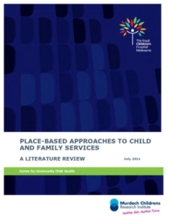This paper synthesizes the conceptual and empirical literature on place-based approaches to meeting the needs of young children and their families. A specific focus of the paper is on the potential contribution of place-based approaches to service reconfiguration and coordination.
Outline
The paper begins by outlining the sweeping social changes that have occurred in developed nations over the past few decades and their impact on children, families and communities. It explores the ‘joined up’ problems faced by families and communities in the contemporary world, and highlights the need to reconfigure services to support families more effectively. The paper then focuses on ‘joined up’ solutions, on what we know about how to meet the challenges posed by the complex problems that characterise our society. Next, the paper explores what a place-based approach involves, and what role it can play in supporting families with young children.
The rationale underpinning place-based approaches is outlined and the evidence for the effectiveness of the approach is summarised. The paper then looks at what can be learned from efforts to implement place-based initiatives in Australia and overseas, and explores the issues that need to be addressed in implementing this strategy. The ways in which the early childhood service system might be reconfigured are also considered, and the paper ends with a consideration of the policy and implementation implications.

